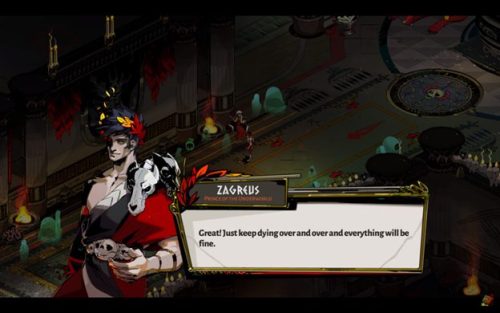By Erik Sabol, Lead Instructional Designer
At first glance, e-learning and video games seem about as far apart on the “interactivity” spectrum as you can get. One is associated with self-improvement and productivity, and the other is associated with literally the opposite of those things.
But ultimately, the best e-learning courses and the highest-rated video games have the same goal — they teach users to complete meaningful tasks in a digital space. Now, these tasks are usually very different (e.g., “quickly locate files in the company’s intranet” vs. “stop evil gods from ushering in the apocalypse”). But they actually flex similar cognitive muscles, and instructional designers can learn a lot by studying the structure and form of modern video games.
Let me give you a few examples.
Instructional Design Consideration 1: A Lack of Information Can Be Engaging
The 2022 Game of the Year — FromSoftware’s Elden Ring — is notorious for its steep learning curve and merciless difficulty. The game provides almost no explicit instructions, and within the first 90 seconds of playtime, users are asked to demonstrate mastery over several of the game’s systems.

You’re a new player? How about you defeat this 13-armed monstrosity in single combat? (Image Source: FromSoftware / @ZullieTheWitch, 2022. Accessed via https://twitter.com/ZullieTheWitch/status/1510256452946247682)
It’s confusing. It’s daunting. At times, it’s discouraging. And it’s also one of the most critically acclaimed interactive experiences ever made.
Meanwhile, in instructional design circles, we’re all terrified of being misunderstood. We don’t want learners to feel flustered or disoriented, so we load our courses with information and exposition. But that’s not always the best answer.
Your learners want to figure things out. They want to experiment. Give them a reason to. Provide the space to explore and hypothesize and give them as little information as necessary. Not only can they handle it — if you do it well, they’ll appreciate it.
Instructional Design Consideration 2: Conflict Keeps Things Interesting
All games are based around a central concept — a sense of progress. That progress is measured in a myriad of ways: points, score, frags, levels, money, etc. If a game doesn’t measure progress, then, by definition, it’s not a game.
But progress, alone, isn’t meaningful. Users aren’t interested in a points value that increases automatically or without effort, because there’s no emotional catharsis in that type of experience.
The missing ingredient is conflict.

Would “Tetris Effect: Connected” be any fun if every block were a straight line? (Image Source: Tetris Effect Connected / Enhance Experience, 2023. Accessed via https://www.tetriseffect.game/)
To learn effectively, your learners need to encounter problems. Meaningful problems. Because no amount of colorful meters or high scores or firework animations or badges will teach anyone anything if learners don’t have to work for them.
So, in instructional design, how do you create constructive conflict? Create an obstacle (based on a real-life context) that stands between your learners and something they desire. If your learners are trying to improve their service etiquette, simulate a conversation with an extremely rude customer. If they’re working to improve their accounting skills, provide disastrous financial statements that need auditing.
But avoid PowerPoint decks. Skip the operational manuals. There’s no inherent conflict in documentation unless you’re training learners to overcome boredom and stay awake.
Instructional Design Consideration 3: Failure is an Opportunity (As Long as It Facilitates Progress)
Failure is scary. Almost nobody likes it. But it is the fastest and most effective way to learn. In fact, there’s an entire gaming subgenre — called “roguelike” — that is completely predicated on failure. Here’s a basic summary of how it works…
Users start the game with no skills or aptitude. They immediately fail but gain important wisdom and insight from the experience. They try again, progress a bit further and fail again. They repeat the process repeatedly, until they have the necessary attributes to finish the game.
Supergiant Games’s 2020 magnum opus, called Hades, is a wonderful example. The game’s plot (which is a stylized retelling of Greek mythology) only advances when users fail, which makes the whole experience compulsive and rewarding.

“Hades” made failure fun—and necessary. (Image Source: Supergiant Games, 2021. Accessed via https://www.youtube.com/watch?v=p4tIx-_DAMg)
The instructional design field has a tricky relationship with failure. We don’t want to demotivate or demoralize learners — which is a legitimate concern — but we almost never ask the question, “How can we make failure meaningful?”
Here’s how not to do it…
- Showing a score at the end of an assessment (“You scored 71%”)
- Popup boxes that say “Whoops!” or “Not exactly!”
- Suggestions to re-review the material and try again
- Redirecting learners to lengthy documents or archives of old resources
None of those techniques incentivizes learners to continue learning. None of them are useful. It’s all just rhetoric and empty calories.
Instead, make failure constructive. Offer tailored insight based on how a learner failed. Provide unique tools specifically for that brand of failure. Give them feedback that pats them on the back and encourages them to learn, grow and keep moving forward.
These lessons — information underload, conflict and failure — are a small handful of what the gaming industry can teach us. Games aren’t known for being educational tools, but they’ve been training people for seven decades (seriously, since 1950 — look it up). And they can teach us an awful lot about instructional design.
To learn more about Bisk and what we do, head here.
